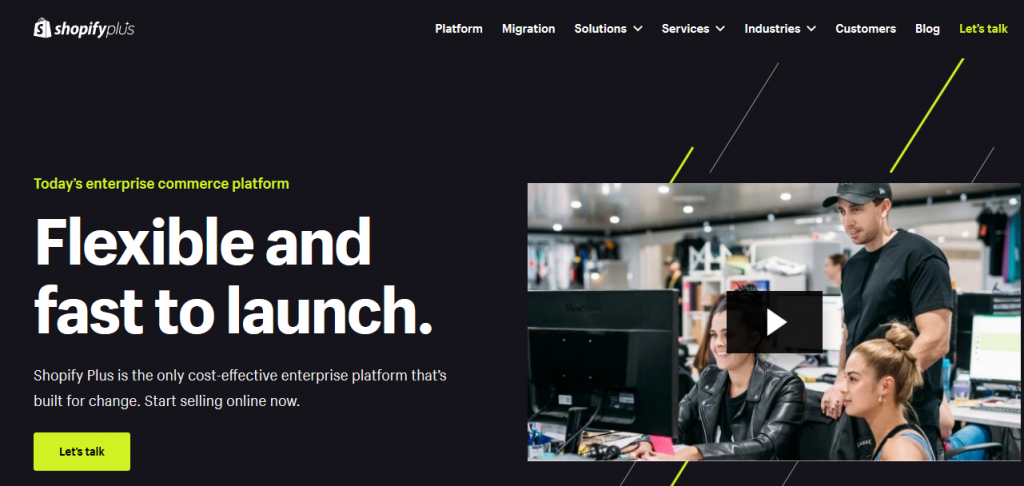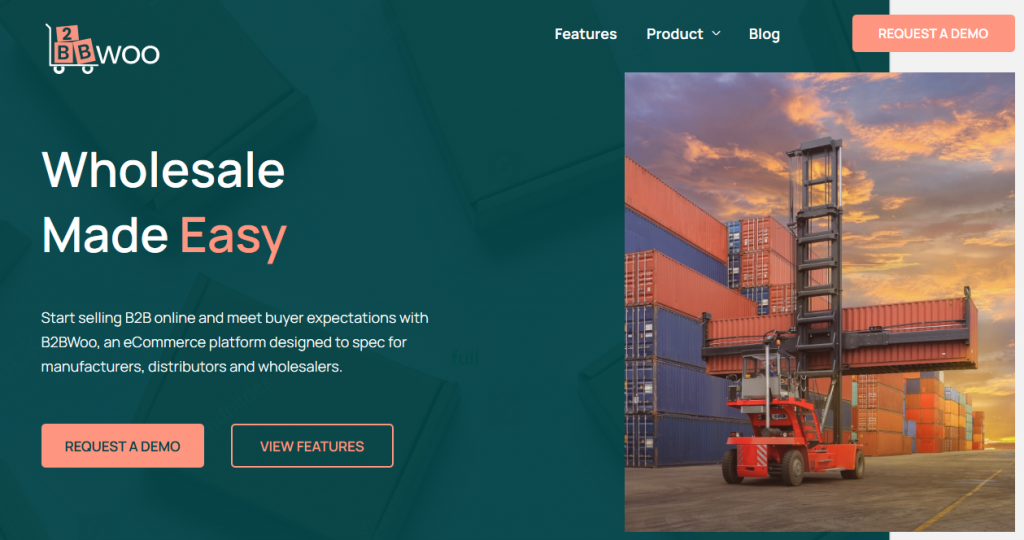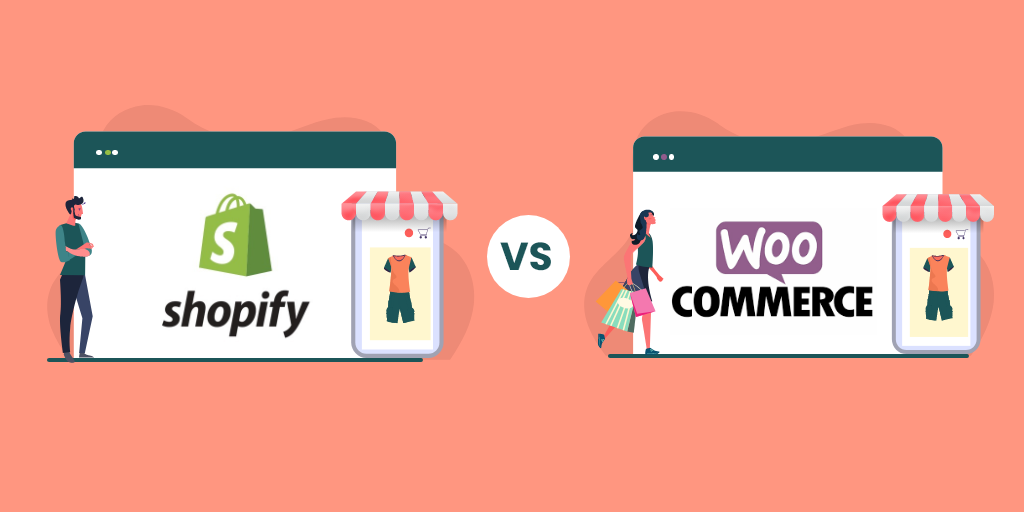When it comes to ecommerce platform adoption amidst COVID-19, we’ve seen B2C covered in great detail and B2B, for the most part, ignored. Because of this, let’s discuss how B2B businesses can implement digital transformation by comparing two popular B2B platforms.
Let’s talk statistics, shall we?
Half a decade ago, Frost and Sullivan predicted that the global B2B market was expected to rise by $6.7 trillion.
B2B market growth had been really good till the end of 2019, growing as much as 18.2% to $1.3 trillion. When the COVID-19 pandemic started, it looked as though it could really damage the eCommerce industry. But then, the opposite happened.
According to IBM’s U.S Retail Index, eCommerce adoption and purchasing has increased by 5 years during the pandemic.
It makes perfect sense. On one hand, you have locked-down buyers looking to purchase products. On the other, you have locked-down store owners who aren’t getting any customers at all.
In both cases, the only available alternative is to go digital!
This is not only limited to just consumer products. To cater to customer demands, traditional B2B businesses are now making the shift towards B2B. For a commercial enterprise, the first step in that transformation usually involves selecting an eCommerce platform.
In this article, we’ll be comparing two of the most popular B2B eCommerce platforms: WooCommerce’s B2BWoo and Shopify Plus and see how they can aid you in running efficient B2B operations.
Overview: Shopify vs WooCommerce
Before we dive into the B2B-specific aspects of both the platforms, let’s give you a quick run-down of the features they provide out of the box.
Shopify
A platform dedicated to eCommerce; Shopify provides you with just about everything you need to create an eCommerce store. It provides you a wide range of tools – from inventory management, to payment integrations, and more– that make your eCommerce processes more efficient.
With Shopify, all you have to do is worry your business. It’s a closed-source solution that takes care of technical factors like hosting, security, and caching from its end.
WooCommerce
WooCommerce is essentially a plugin for WordPress. In recent years, however, it has ascended beyond that status to become the go-to platform for all sorts of eCommerce users.
Being built on an open source platform like WordPress, it provides you with in-depth customizations. From an eCommerce perspective, it provides you with all sorts of tools that lets you create a store with ease.
Besides its countless merits, you need to have some level of technical competency when using the platform. Unlike Shopify, you need to manage all the concerns of hosting, security, and caching from your end.
There are so many features that can be compared between Shopify and WooCommerce. For the sake of simplicity (and the fact that our comparison is purely B2B-specific), we’ve presented the reader with a tabular comparison.
| Shopify | WooCommerce |
| Subscription based eCommerce service, providing you with a complete, out-of-the-box eCommerce solution. | Free to download, but requires pre-requisites like hosting and domain names. |
The Core Similarities and Differences
| Shopify | WooCommerce |
| You can use it as both an eCommerce store and a Point-of-Sale store. | You can only use it as an eCommerce store. |
| No restrictions on what you can sell (physical or digital products and services). | No restrictions on what you can sell (physical or digital products and services). |
| 24/7 Support provided by Shopify itself. | Tickets, forums, and blog support. |
| Closed platform software that lets you modify store operations to an extent. | Open source platform lets you modify your store operations. |
| Shopify has control over your store’s data. | You have complete control over your page’s data. |
Store Design
| Shopify | WooCommerce |
| Variety of paid and free themes to choose from. | Thousands of free and paid themes available. |
| Mobile friendly structure. | Mobile friendly structure. |
Miscellaneous Differences
| Shopify | WooCommerce |
| Hosted platform | You have to purchase hosting |
| Subdomains available for your store. | No subdomain available. |
| SSL comes with your subscription. | You can either a purchase an SSL or is provided by your hosting provider. |
| File storage is unlimited. | File storage depends on your web host. |
| There is no limit to the number of products you can sell. | There is no limit to the number of products you can sell. |
| Both can create coupons and discounts. | Both can create coupons and discounts. |
| Extensive sales statistics and reporting. | Extensive sales statistics and reporting. |
Multiple payment gateways and methods. | Multiple payment gateways and extensions for other payment methods. |
| Multi-lingual support. | Multi-lingual support through 3rd party plugins and themes. |
| Taxes and shipping rates are available. | Taxes and shipping rates are available. |
This is the general comparison between the two platforms. Now, let’s dig a bit deeper into the comparison that focuses on solely B2B-specific functionalities.
WooCommerce vs Shopify for B2B Ecommerce
Shopify Plus

Shopify’s flagship product, Shopify Plus provides its subscribers with several B2B-specific solutions. The features, on top of Shopify’s native themes, extensions, and applications, make for a powerful B2B experience.
Besides providing you with a dedicated B2B setup, Shopify Plus provides you with several value-laden features.
- Password Protected Shop: Wholesale eCommerce store owners don’t offer the pricing of their products out in the open. With Shopify Plus wholesale, you can lock your eCommerce store; hiding products from users unless they register or log-in to your account.
- Catalog Management: Within your store, you can create customized catalog for your various customer groups. Within those groups, you can create pricing tiers. For example, you can set fixed prices, or proportional increases in prices.
- Purchasing Terms: Unlike B2C businesses, B2B purchases are made on account (on credit terms). Depending on the purchaser, owners can set payment terms like Net 30 or Net 60. With Shopify Plus, you can enable your buyers to purchase from your store on account.
- Search engine visibility: While search engine visibility is an important thing, some B2B store owners don’t want their website to show up on search engines. Shopify Plus, with its integrated wholesale channel, allows you to remove parts or all of your store from search engines. Best of all, you don’t have to have any programming skills to get the job done.
- Professional inventory management: Minimum and maximum order quantities are the mainstay of B2B eCommerce. Shopify plus helps you integrate these MOQ’s at different customer levels.
- Integration into existing systems: If you’ve been running an eCommerce store for a while now, you’re probably using a CRM/ERP/WHMS system. Going digital with Shopify Plus means that you don’t have to worry about overhauling your existing back-office systems with newer ones. The platform can be integrated via API’s to seamlessly integrate with your existing architectures.
B2BWoo

In the past, there wasn’t a dedicated B2B setup on WooCommerce. What you did have were WooCommerce plugins that fulfilled specific B2B functionalities.
The situation has changed significantly with platforms like B2BWoo that provide an all-in-one WooCommerce B2B solution similar to Shopify Plus.
B2BWoo comes with a variety of different features that make the wholesale experience better:
- Corporate Account Management: B2B purchasers are different from their B2C counterparts. Instead of a single purchaser, you have groups of sales representatives purchasing for a company. To facilitate those groups on your store, B2BWoo provides a roles and permissions management functionality that allows the owner to create purchaser hierarchies on their store.
- Quick Order: B2BWoo allows businesses to integrate a plug-and-play quick order table that enables their customer to order products directly from the table as opposed to ordering each product individually. This helps smoothen the customer experience and increase conversion rates.
- Quotation Management: This feature enables owners to integrate their eCommerce store with a request for quote button allowing users to request concessions on an order based on different factors. Allowing you to negotiate prices, this functionality also allows you to set purchase terms with your buyers.
- Show or Hide Products: B2BWoo provides you with the ability to show or hide products based on a user’s login status. Additionally, you can hide prices and show products at different product levels.
- Integrations: Similar to Shopify Plus, B2BWoo comes with a variety of integrations. Regardless of the technology stack, B2B integrates seamlessly through API’s with your existing systems via API’s to deliver an interconnected B2B experience that helps you reduce redundancies in your processes.
Comparison and Contrast
We’ve discussed the major features provided by these two B2B platforms. Now comes the question, which one is better to use?
In terms of market share, WooCommerce is just a bit above Shopify. When it comes to enterprise websites, however, Shopify has the lead. But those are just for the eCommerce industry as a whole. What about B2B in particular?
In terms of functionalities, both platforms are essentially the same. They both aim at improving the B2B experience for users.
- Both platforms are highly scalable solutions built to grow with your business.
- Both are products built on top of industry leading brands.
- Both allow you to integrate seamlessly with your existing systems with ease, thereby reducing your headaches during the digital transformation process.
- With both, you can sell globally without inhibitions
At the end of the day, your selection boils down to your preferences. If you want a highly customized keeping the technical functionalities in check, go for B2BWoo. On the other hand, if you just want an eCommerce solution where you don’t have to worry about the technicalities, then go for Shopify Plus.
Conclusion
In this guide, we performed a comparison between Shopify and WooCommerce at the B2B level. We took B2B specific considerations into account and provided you a comparison between Shopify Plus and B2BWoo.
Both Shopify and WooCommerce are very effective in their own right. At the end of the day, your choice of platform depends on what you want to achieve with it, a point we elaborated upon in the preceding section.
To get a demo of what you’re getting with both the platforms, you can check out both Shopify Plus and B2BWoo.
Read Also
The Main Challenges B2B Companies Face When Implementing eCommerce
Seizing The B2B Ecommerce Advantage In the Brave New World of Covid-19
